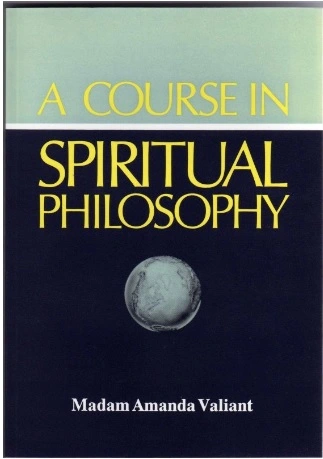🕓 Last Updated: March 11, 2024, 4:45 pm (PH time)
Jesus Christ’s death is not salvation for our sins. It neither is a metaphor for saving mankind from their sins. “I did not die to save anybody,” said Jesus Christ, himself, in his script that was written in the book of Amanda Valiant, A Course in Spiritual Philosophy. Jesus Christ added that he did not die on the cross or at the Calvary. This could be a revelation so controversial that mainstream religions, especially the Catholic Church would ban this knowledge from public consumption. But this time we all know that Jesus Christ’s death was not meant to save mankind after all.
In an attempt to understand life and existence, one may find spiritual philosophy as important as the rest of the philosophies that exist. For truth and in truth, nobody on this planet has attained the pinnacle of certainty to attest truthfulness of their self-claimed philosophies or any other philosophies claimed and developed by philosophers be they were from the pre-Socratic era down the Socratic age through the post-Socratic then in modern age philosophy that this mankind has ever found. Yet, except for those individuals who had attained the highest spiritual development to consider enough their philosophies and knowledge and wisdom they had earned or acquired from the so-called divine beings.
Who is Amanda Valiant?
Born in Redruth, Cornwall, England on July 20, 1925, Amanda Valiant had never known it exactly almost in her entire life that she had this true calling and destiny to live in her life. Amanda was told by a divine being that she had reincarnated for a special purpose. Together with her husband, Alan Valiant, she founded The College of Alithology—the study of truth.
In other words, Amanda Valiant is a higher-order being in the hierarchy in Heaven who reincarnated to write all facts and information that pertain to the spiritual domain and about matters that concern both in Heaven and on Earth. While incarnate on Earth, she had this opportunity to speak or communicate with Jesus Christ and other divine beings, especially the Lord God Archibald who helped Amanda in obtaining facts and information about life and existence in Heaven and on Earth. Furthermore, her book, A Course in Spiritual Philosophy, is a compilation of facts and information that were passed to her from the highest beings in the spiritual realm who had communicated with her many a time.
Do you expect us to believe Amanda Valiant?
Like anybody else, even the popes, the priests, the ministers of churches and their leaders, and even those who have spiritual abilities and supernatural skills too sufficient to make us believe as it can be too good to be true, nobody is expected them to believe anything that is not of his or her comfort zone to believe such things that neither he nor she even experienced it first-hand.
People are born rational. This rational thinking leads people to experience duality when it comes to perception, conceptualization, rationalization, and comprehension. With so much influence of the norms and standards that society has kept on feeding them that penetrate the subconscious mind of every individual, it is too much of a reason to expect no one to believe in something more especially when the idea marred the very foundation of anyone’s belief taught by his or her religion for generations after generations.
Suppose we take out Amanda Valiant from this scene, and replace her with the mainstream religions’ pope or church leaders. Do we expect you to believe Pope X or Fr. Y stating other things that refute the claims of Amanda Valiant?
Suppose it is in an affirmative, can you know the very reason and the cornerstone of your belief affirming what these mainstream religion people are claiming?
Can you specify a detail or two with utmost certainty that these people whom you prefer to believe according to your thought and perception and by all means of your analytical skills can able to peruse in all possible means, speak of truth and nothing but the truth without bending your knees to surrender to the words written in your so-called “holy bible”—a compendium of various stories from various authors nobody and not even your popes and priests have even figured them out so well about the credibility, trustworthiness, reliability, and integrity of these unknown authors of biblical stories?
Yet, you deemed them as authorities of truth despite you having no deeper knowledge about them. Is it not outright injustice for yourself?
Feelings are relative
The anatomical structure of feelings is conclusively affected by information that is deeply penetrated in the mind. As a child grows up into an adult in a community with a dominant belief in something, the information, be it facts or myths, is gradually penetrating deep down to the subconscious level of the mind in a child.
This information, if undisturbed, will someday become a guiding perspective of the child. It becomes part of the child’s philosophy that in the process can be mistaken as perceived truth, conceived reality, or even becomes the child’s ultimate way of life emboldened by emotion, perception, and conceptualization making it a tool in child’s manner of perceiving, conceiving, and comprehending things that serve the child’s perceived truth and conceived reality.
Hence, feelings are relative. As people would rather tend to find solace in feelings as they possibly blunder their feelings for intuition, then out of the way, this perceived truth out of a particular belief that is already embedded deeply in their subconscious minds would become their easy way out to embrace the comfort in believing intimately in what they used to believe, be it a perceived truth, unquestioned facts, or outright myths.
Hence, the moment these people are introduced to a new idea or a new belief, some of them may conditionally accept it while the rest may outright reject it.
What actually was the purpose of Jesus Christ on Earth?
From the words of Jesus Christ through the book of Amanda Valiant, he was asked by a high spiritual being, Gabriel, while he was in Plane Five in heaven to work on a special task to introduce spiritual matters to mankind. Jesus Christ, himself, revealed that he was sent by the Gardeners of the Earth and not by God.
Moreover, Jesus Christ then confessed that he failed in his mission when he was crucified at the Calvary. From his words, he said, “I did not die to save anybody. I did not die on the cross at the Calvary at all.”
Furthermore, Jesus Christ categorically claims that he is not the son of God, nor is he a god. “I am Jesus Christ, a man born like any other man and who died like any other man. God did not send His only begotten son to Earth because God has no son and cannot, as a Spiritual Being, possibly have one,” Jesus Christ wrote.
Now, if anyone tries to counter these claims about Jesus Christ’s revelation written in the book of Amanda Valiant, let him or her argue without referencing all his or her claims to the so-called “holy bible” or anything that comes from the mainstream religions’ scriptures.
Why? Is it not awkward or at least a self-insult with full disgrace to utilize those biblical stories and scriptures without even having full knowledge about who those folks that wrote such stories in the bible not to mention their reliability and trustworthiness, and yet this someone will use it in defense of his or her argument in such a way that he or she believed it so much? That is a really funny joke.
This quote attributed to Winston Churchill would somehow help us exercise caution, “History is written by victors,” that can be liberally meant that all that is written in history is not at all times grounded in facts; how much more of truth?
“I did not die to save anybody”
The book by Amanda Valiant vividly claims that Jesus Christ’s death was not meant to save mankind. Jesus Christ in his script written in that book further reveals that he did not even die on the cross and at the Calvary. Moreover, he died just like any other man in a natural cause.
This revelation of Jesus Christ, himself, through the book by Amanda Valiant, controverts all stories written in the Christian Bible interpreting the death of Jesus Christ as a salvation to mankind. In addition, he even goes as far as professing that his so-called mother Mary is not at all a virgin.
Furthermore, Jesus Christ asserts that he is the third child of Mary; therefore, how she can be a “virgin” when she already had the first and the second child before she gave birth to his third child Jesus Christ? The same revelation also seeks to put things right, especially what the Christian Bible has written about Jesus Christ either erroneously or deliberately misrepresented.
What separates from the various authors of gospels in the Christian Bible and Amanda Valiant?
Various authors of gospels in the Christian Bible are either self-proclaimed in their titles, or widely known for their titles, and even widely accepted or considered as they are. Jesus Christ’s 12 disciples are considered widely known as they are, while others are widely considered or accepted like in the case of the Apostle Paul.
Taking into consideration the case of the Apostle Paul, his reliability and trustworthiness early on can be viewed as odd. Early half of his life, Paul rejected the view that Jesus Christ is God’s chosen being. He held his view so dear he even went on persecuting Christians defending his view that is categorically anti-Jesus Christ until his self-proclaimed story that happened to him on his way to Damascus when he had a vision according to him.
Now, do you believe him and in his vision story? If it is in the affirmative, why would you not also believe Amanda Valiant when she self-proclaimed that she is what she was? Why? Is it because she was not widely accepted or even considered and known?
In all respects, this is what separates Amanda Valiant from the authors of various stories and gospels in the Christian Bible. People are extremely conditioned to be persuaded by numbers and prominence. People are easily convinced by a widely accepted and regarded personality and outrightly consider them as the authority in their field without even thinking why should they be regarded as such. That sick mindset. ▲

Reference: Valiant, A., & Valiant, A. (1991). A Course in Spiritual Philosophy. Alan Valiant.
The views and opinions expressed in this article are those of the author and do not necessarily reflect the official policy or position of any affiliated organization, employer, or institution. The author bears sole responsibility for the content.
📩 Subscribe to The Philippine Pundit
Stay updated with the latest news, insights, and stories. Join our mailing list today!

Regel Javines is the independent voice behind the Philippine Pundit. With roots in grassroots work and government service—from open-source research analysis with the Philippine Air Force and news desk duties at The Manila Times, to development and congressional assistance work at Congress—he brings unique insights shaped by philosophy, justice, and lived experience. His mission: to give voice to the unheard and raise questions that stir the soul.